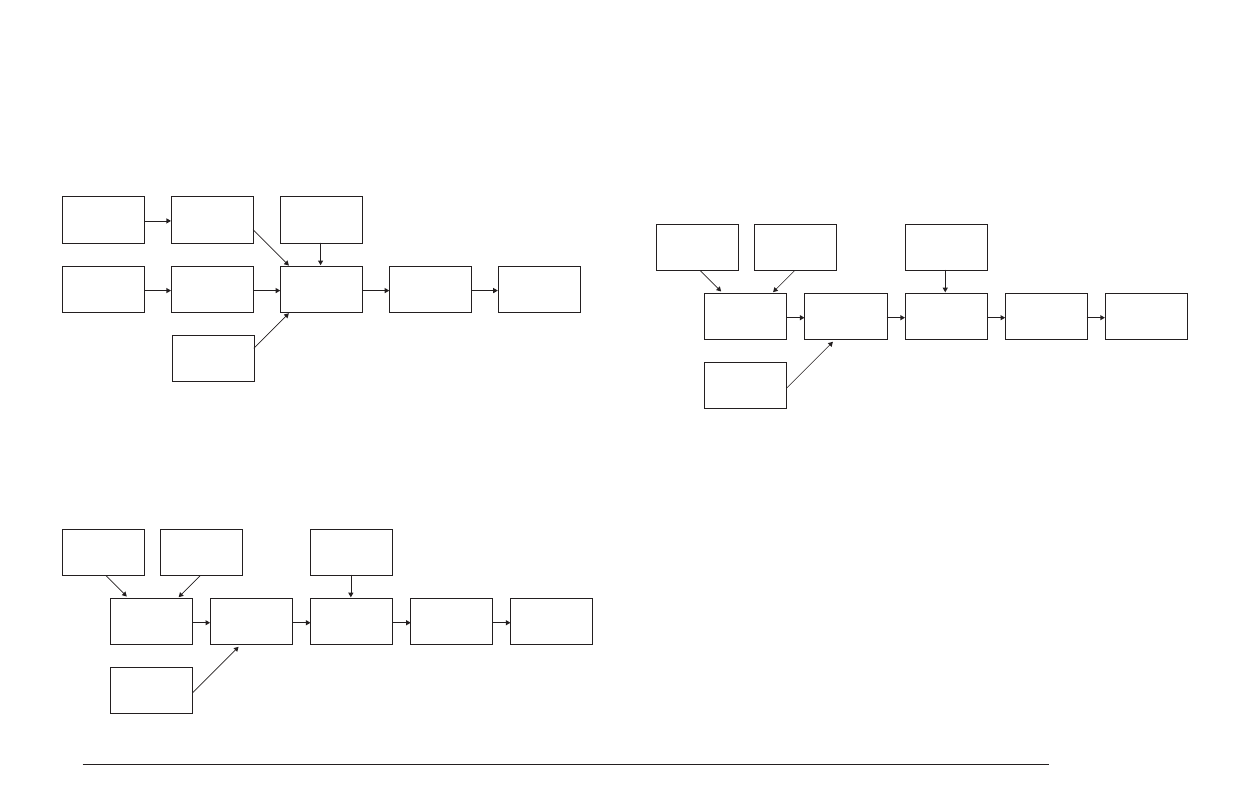Snare voice (voice 4), Cymbal/clap (voice 5), Hi-hat voice (6) – Erica Synths LXR-02 Drum Machine Synthesizer User Manual
Page 10: Voice parameter menu sections, 4 hi-hat voice (6), Pattern generator mode

5.5. VOICE PARAMETER MENU SECTIONS
The synthesis parameters of each voice can be altered in voice edit mode. The
synthesis engine is grouped into 8 different sections that can be selected with the
select buttons. In this section each of those 8 menu pages and their parameters
are described.
OSCILLATOR PAGE (OSC)
Provides access to the main oscillator parameters. Frequency and waveform of
the main oscillator can be set here.
OSCILLATOR
OSCILLATOR
OSCILLATOR
VOL EG
FILTER
AMP
DISTORTION
SAMPLERATE
REDUCER
TRANSIENT
GENERATOR
OSCILLATOR
OSCILLATOR
OSCILLATOR
VOL EG
FILTER
AMP
DISTORTION
SAMPLERATE
REDUCER
TRANSIENT
GENERATOR
PITCH EG
VOL EG
OSCILLATOR
AMP
DISTORTION
SAMPLERATE
REDUCER
TRANSIENT
GENERATOR
FILTER
NOISE
5.2. SNARE VOICE (VOICE 4)
This voice is good for snare-drum and clap sounds. A noise source and a
pitched oscillator can be mixed. Only the noise source is routed trough the filter.
There is no FM capability on this voice.
5.4 HI-HAT VOICE (6)
The hi-hat voice is nearly identical to the Cymbal voice, but it offers 2 different
decay times for the amplitude envelope. The voice is shared between sequencer
tracks 6 and 7, each using one of the 2 available decay times. This allows for playing
open and closed hi-hats. The closed hat (track 6) will choke the open hat (track 7).
5.3. CYMBAL/CLAP (VOICE 5)
This voice uses a 3 operator FM to generate the sound. The main oscillator is
modulated by 2 modulation oscillators. It's great for metallic and noisy sounds!
MORPH KITS
A morph kit is a normal kit that is loaded as morph target. Any kit can be loaded as
a morph target.
Loading
> Press LOAD + MORPH
> Select the preset number of the kit you want to load.
> Push the encoder.
> The morph sound is loaded.
> Please note that you won't hear any change if the morph parameter value is set to
zero.
> Use the morph parameter on the performance page to morph the current kit into
the loaded morph kit.
Saving
You can also save the resulting sounds from morph operations. Just press the
SAVE + MORPH buttons and save the sound as a new kit. Instead of the original
sound, the currently playing mixture of the 2 presets will be saved.
Did you know?
If morphing arbitrary presets is too drastic for you, try modifying your
favourite pattern just a little bit and save it to a new location. Now you
can control all tweaked parameters at once!
SONGS
The process to load and save songs is the same as described for the kits. Just use
the button combo Press LOAD + SONG or SAVE + SONG instead.
PATTERNS
Patterns are a special case as they have no name. Loading and saving is done in
a similar fashion like changing patterns in pattern mode.
Loading
> Press LOAD + PATTERN
> The screen will show “Select Pattern, Current: x”
> Now you can use the SEQUENCER and BAR buttons to select the pattern to load.
> If the sequencer is playing, the new pattern will start after the current pattern
has finished playing.
Saving
> Press SAVE + PATTERN
> The screen will show “Save Pattern, Current: x”
> Now you can use the SEQUENCER and BAR buttons to select where to save the
pattern.
> As soon as you press the SEQUENCER button, the display will show “success!”
and the pattern is saved.
PROJECT
The process to load and save project is the same as described for the kits. Just
use the button combo Press LOAD + PROJECT or SAVE + PROJECT instead.
Where Projects are special is in regard to the place where they are saved. All
previous datatypes are loaded from and saved to the non persistent RAM region
where the project data is located. Projects however are saved to the memory
card and are the only way to save kits, songs and patterns so they will be
restored after a power cycle. Projects are containers that are a collection of Kits,
Patterns, Songs and settings.
7.5. PATTERN GENERATOR MODE
The pattern generator provides an easy way to generate interesting poly rhythms
on the fly. You just have to set the desired pattern length and the number of
active steps to generate a new pattern using the euclidean algorithm.
1
LXR OWNERS MANUAL
10
